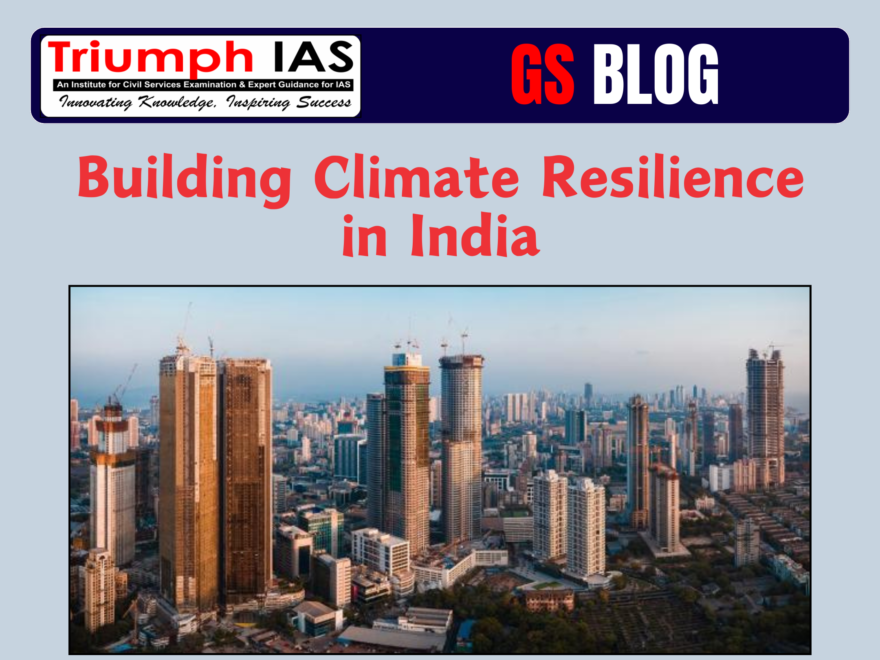Building Climate Resilience in India
As global temperatures rise and extreme weather events become more frequent, climate adaptation is as vital as mitigation. The UN cautions that the 1.5°C threshold could be exceeded within 15 years, placing countries like India at heightened risk. Given the limitations in international climate finance, India has an opportunity to lead with solutions that integrate adaptation with mitigation. With the upcoming COP in Baku, initiatives like India’s PM Surya Ghar Yojana could offer a model for sustainable adaptation in the Global South.
Climate Adaptation and Climate Mitigation
- Climate Adaptation: Climate adaptation is the process of adjusting practices, systems, and infrastructure to cope with current or anticipated climate impacts. This includes implementing social, economic, and environmental changes to reduce the harm caused by climate change. Examples include constructing flood barriers, developing drought-resistant crops, enhancing water management, and setting up early-warning systems for natural disasters.
- Climate Mitigation: Climate mitigation focuses on reducing or preventing greenhouse gas emissions to limit global warming and address climate change at its source. Strategies include shifting to renewable energy sources like solar and wind, improving energy efficiency, promoting reforestation, and decreasing fossil fuel dependence.

Need for climate adaptation
- Inevitability of Near-Term Impacts: The Earth has already warmed by 1.1°C, and even drastic emission cuts will not prevent certain climate impacts from intensifying in the coming decades. Vulnerable communities require urgent adaptation strategies to withstand these severe changes. Record-breaking temperatures in 2023 have increased poverty risks for 32 to 132 million people by 2030, while climate-related losses reached USD 260 billion in 2022.
- Economic Cost of Inaction: Delaying adaptation increases costs in disaster response, infrastructure damage, and economic instability, particularly for developing nations. However, a global investment of USD 1.8 trillion in adaptation measures—such as early warning systems, resilient infrastructure, enhanced agriculture, coastal mangrove protection, and water resource management—could yield USD 7.1 trillion in avoided costs and social benefits.
- Food and Water Security Crisis: Climate change disrupts agriculture, water availability, and food production, making adaptation essential for global food security. A recent study using the IPCC’s highest warming scenario predicts a 17% global decline in yields for major crops (coarse grains, oil seeds, wheat, and rice) by 2050, impacting around 70% of the world’s harvested area.
- Urban Vulnerability: Over half the global population lives in cities, which face specific climate risks like urban flooding and heatwaves. Adaptation in infrastructure, housing, and public services is essential. As most urban expansion in developing countries is in hazard-prone areas, adaptation costs are expected to reach USD 295 billion annually by 2050.
- Ecosystem and Biodiversity Preservation: Mitigation alone cannot protect ecosystems under stress from climate change; adaptation is critical for biodiversity and ecosystem services. The IPBES Global Assessment estimates that 1 million animal and plant species are at risk of extinction, while $44 trillion of economic value depends on nature’s services, according to the World Economic Forum.
- Health System Resilience: Climate change introduces new health threats and exacerbates existing ones, requiring adaptation of health systems and infrastructure. The WHO projects 250,000 additional annual deaths by the 2030s from climate impacts on diseases like malaria and coastal flooding. Vulnerable populations face disproportionate harm, highlighting adaptation as key for social equity. The 2024 World Migration Report projects that climate impacts will displace 216 million people within their countries by 2050.
India’s Progress Towards Climate Adaptation
- Policy Framework and Planning: India has established robust adaptation strategies through its National Action Plan on Climate Change (NAPCC), emphasizing a structured approach to climate resilience. The framework includes eight national missions, supported by the Long-Term Low Carbon Development Strategy (LT-LEDS) submitted at COP27. Thirty adaptation projects have been approved at a total cost of INR 8,470 million, as noted in India’s Third Biennial Update Report to the United Nations Framework Convention on Climate Change. In the 2024–25 budget, ₹3,030 crore was allocated specifically for climate action.
- Agricultural Adaptation: India promotes climate-smart agriculture through initiatives like the National Innovations in Climate Resilient Agriculture (NICRA) and Pradhan Mantri Krishi Sinchayee Yojana (PMKSY), focusing on drought-resistant crops and efficient irrigation practices. More than 200 stress-tolerant crop varieties have been demonstrated across 446 Climate Resilient Villages (CRVs) in 151 vulnerable districts. The PM-KISAN scheme further supports 11.3 crore farmers, encouraging climate-adaptive practices.
- Water Resource Management: Programs led by the Jal Shakti Ministry, including the Jal Jeevan Mission and Atal Bhujal Yojana, enhance water resource management and conservation. As of October 2024, Jal Jeevan Mission has provided tap water connections to 11.95 crore additional rural households, reaching a total of over 15.19 crore households.
- Urban Resilience: Urban adaptation is advanced through initiatives like the Smart Cities Mission and AMRUT 2.0, which integrate climate resilience into city planning. By July 2024, India’s 100 Smart Cities had completed 7,188 projects, representing 90% of total projects planned under the mission.
- Coastal Adaptation: Coastal resilience is strengthened by the National Coastal Mission Scheme and state-led efforts focused on mangrove restoration, sea wall construction, and early warning systems. Over the past decade, India has increased mangrove cover by 364 sq km, and early warnings from the Indian National Centre for Ocean Information Services (INCOIS) are now available to many coastal villages.
- Renewable Energy and Adaptation: Programs like PM-KUSUM and PM Surya Ghar Yojana drive renewable energy adoption, combining mitigation with adaptation benefits for at-risk communities. As of October 2024, India’s renewable electricity capacity reached 201.45 GW, accounting for 46.3% of total installed capacity and marking a significant transition to clean energy.
- Health Sector Adaptation: The National Action Plan for Climate Change and Human Health strengthens health infrastructure against climate impacts. By 2023, India had established 1.6 lakh Health and Wellness Centers under Ayushman Bharat and introduced principles of green and climate-resilient hospitals under the Indian Public Health Standards (IPHS) 2022.
- Financial Mechanisms: India is developing financial mechanisms for adaptation, including green bonds, climate budgeting, and international partnerships. In FY 2022–23, the government raised ₹16,000 crore through Sovereign Green Bonds (SGrB). The National Bank for Agriculture and Rural Development (NABARD), as the National Implementing Entity for the National Adaptation Fund for Climate Change (NAFCC), releases funds based on project performance and adherence to NAFCC guidelines
Major Challenges for India in Climate Adaptation
- Financial Constraints: India faces a substantial gap between the financial resources required for climate adaptation and the available funding. Limited domestic fiscal capacity and insufficient international support hinder the implementation of critical adaptation initiatives. This challenge is further intensified by competing developmental priorities and high initial costs of adaptation infrastructure. Meeting adaptation needs across industries will require an estimated expenditure of ₹85.6 trillion (USD 1.05 trillion) by 2030.
- Data and Monitoring Challenges: India’s adaptation efforts are hampered by insufficient climate data infrastructure, limited local vulnerability assessments, and weak monitoring systems, which impact evidence-based planning and project implementation. Over 80% of India’s population lives in districts highly susceptible to extreme hydro-meteorological disasters, while only 0.86% of districts show high adaptive capacity, as noted by the Council on Energy, Environment, and Water.
- Urbanization and Infrastructure Pressure: Rapid urbanization is straining existing infrastructure and increasing adaptation demands in cities. India’s urban population is projected to reach 600 million by 2036, and according to the National Institute of Urban Affairs (NIUA), 70% of urban infrastructure needed by 2030 is still to be built, underscoring the need for climate-resilient urban planning.
- Agricultural Vulnerability: Small and marginal farmers, who make up 86% of India’s farming population, face significant challenges in adopting climate-resilient practices due to limited resources and lack of access to knowledge. Climate variability is projected to reduce agricultural productivity by 10-40% by 2100, posing a serious risk to food security.
- Water Stress Management: Effective water resource management for adaptation is increasingly challenging due to irregular monsoons, groundwater depletion, and competing demands. NITI Aayog’s Composite Water Management Index reports that 600 million Indians are facing high to extreme water stress. The northwestern region of India is anticipated to face critically low groundwater levels by 2025, according to a recent United Nations report.
- Coastal Vulnerability: India’s 7,500 km coastline is increasingly vulnerable to sea-level rise, cyclones, and erosion, impacting millions of coastal residents. Currently, one-third of India’s coastline is prone to erosion, posing adaptation challenges for affected communities.
- Climate-Induced Migration: Managing climate-induced migration and providing adaptation support for displaced communities is a rising concern. By 2050, India could see up to 45 million people displaced due to climate change, necessitating proactive adaptation and support measures.
Measures that India can Adopt to Accelerate Climate Adaptation
- Enhanced Financial Mechanisms: Strengthening financial support for climate adaptation requires revamping the National Climate Adaptation Fund, financed through carbon taxes, environmental cesses, and contributions from Environmental, Social, and Governance (ESG) initiatives. This fund will provide targeted resources for adaptation projects. Additionally, state-level green bonds for adaptation initiatives will enable state governments to raise essential funds. Blended finance mechanisms, combining public funds with private investments, will increase overall financial capacity. Innovative financial products tailored for climate adaptation projects will attract investments, while state-level special purpose vehicles (SPVs) will ensure efficient fund management and allocation.
- Localized Adaptation Planning: Effective climate adaptation requires community-level planning. Each district should establish climate adaptation cells staffed with technical experts to assess local vulnerabilities and develop targeted solutions. By combining traditional knowledge with scientific data, these cells can implement location-specific adaptation strategies.
- Technology-Driven Monitoring: A technology-based approach to climate monitoring will enhance preparedness and response capabilities. A national digital platform should integrate real-time climate data, providing accessible information for decision-makers and communities. Deploying IoT sensors and satellite monitoring systems will support early warnings for climate-related events. Community-level monitoring mobile applications will also empower citizens to participate in data collection and reporting.
- Agriculture and Water Resilience: Building resilience in agriculture and water management is essential for climate adaptation. Scaling up climate-smart agriculture through incentive programs will encourage sustainable practices, enhancing productivity while minimizing environmental impacts. Promoting drought-resistant crop varieties will help farmers manage water scarcity, while efficient irrigation systems will optimize water use.
- Urban Climate Resilience: Urban climate resilience requires climate-resilient building codes that set standards for new constructions. Urban planning should incorporate sponge city concepts to enhance water management and reduce flooding risks. Urban forests and heat action plans will help mitigate urban heat effects, and sustainable transport systems will cut emissions and improve air quality.
- Coastal Adaptation: Coastal areas need integrated management strategies to effectively respond to climate challenges. Implementing integrated coastal zone management will balance development and conservation. Climate-resilient port infrastructure will protect these economic assets, while mangrove restoration will provide natural barriers against erosion and flooding. Strengthened coastal early warning systems will also enhance preparedness for extreme weather events.
- Skill Development: Investing in skill development is essential to build climate adaptation capacity across sectors. Specialized climate adaptation skill programs will train individuals in effective practices, while climate education centers will enhance public awareness and promote a culture of adaptation.
- Private Sector Engagement: Engaging the private sector is crucial for scaling up investments in climate adaptation. Developing tax incentives for adaptation investments will encourage businesses to contribute to resilience projects. Mandating climate risk disclosures will foster transparency, prompting corporations to account for climate impacts in their operations. Supporting climate-resilient business models will further incentivize private sector involvement.
- Research and Innovation: Advancing research and innovation is critical for effective climate adaptation solutions. Climate adaptation innovation hubs will serve as centers for developing new strategies and technologies. Research consortiums will promote collaboration among academic institutions, government, and industry to drive adaptation research.
- Inter-State Coordination: Effective adaptation requires collaboration across states. Regional Climate Adaptation Councils will facilitate communication and resource-sharing for shared challenges. Cross-state adaptation projects will pool resources and expertise, addressing regional climate impacts. Coordinated resource management and harmonized adaptation policies will strengthen resilience across states.
- Mainstreaming Adaptation: Embedding climate adaptation in development planning is vital for long-term resilience. Integrating adaptation into all levels of planning will ensure proactive climate impact management. Existing infrastructure should be assessed and upgraded to withstand future risks, while adaptation indicators will enable ongoing monitoring, evaluation, and continuous improvement of adaptation initiatives.
India’s proactive efforts in climate adaptation are noteworthy, yet substantial challenges persist. To accelerate progress, India must enhance financial mechanisms, bolster localized adaptation planning, harness technology, and prioritize resilience in agriculture, water resources, urban infrastructure, and coastal areas. By addressing these challenges and implementing comprehensive adaptation strategies, India can build a resilient future and set an example for the Global South.
The End of the Blog: Building Climate Resilience in India

|

















